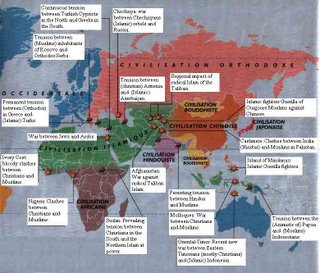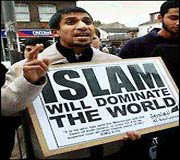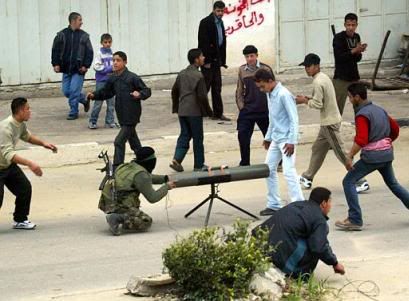Tuesday, February 20, 2007
Islamists Blamed in Indo-Pakistani Train Bombing
Islamists Blamed in Indo-Pakistani Train Bombing
By The Daily Telegraph
February 20, 2007
PANIPAT, India — Islamist militants were accused of trying to halt the nascent Indo-Pakistan peace talks yesterday after two bombs exploded on the New Delhi-to-Lahore train killing at least 66 people, including women and children.
The blasts, which killed mostly Pakistanis returning home after visiting relatives in India, came just 24 hours before Pakistan's foreign minister was due in New Delhi for a fresh round of talks to resolve the status of Kashmir .
The attack, mounted using crude kerosene-based incendiary devices packed into suitcases, set off fires in two of the carriages shortly after midnight local time as the train reached Panipat, a industrial town 50 miles north of New Delhi.
The train link, known as the "Friendship Express," was restarted after a two-year hiatus in 2004 as a peace dividend, reuniting families divided by the Partition of India in 1947.
Indian police said the death toll would have been considerably higher had two other explosive devices that were found on the train not failed to detonate.
Local witnesses described how passengers leapt from the train with their clothes on fire as the screams of those trapped inside filled the night. As most Indian trains have steel rods instead of glass fitted in the windows many were left trapped as temperatures rose high enough to melt metal and fuse doors closed. A laborer who lives, Rajinder Prasad, said he had rushed to the scene with his neighbors. There, they scooped up water from a reservoir and threw it on the flames, which towered above the carriages.
"We couldn't save anyone," he said. "They were screaming inside, but no one could get out." Within minutes, he added, the screams were silenced by the flames.
There were scenes of distress at Panipat's Civil Hospital where relatives came to identify the remains of their loved ones, many of whom police said will be identified only by post-mortem examinations.
Yesterday, both countries insisted that the talks, which began three years ago in an attempt to resolve the 60-year-old dispute over the Himalayan state of Kashmir, would not be thwarted by terrorism. India's Prime Minister Singh issued a statement expressing "anguish and grief" at the loss of life, while the country's home minister, Shiv Raj Patil, said, "Whoever has done it is against peace, against the friendly ties that we are trying to build with other countries."
New Delhi's response was in contrast to July last year when Islamist militants were blamed for causing 186 deaths in a coordinated series of bomb blasts on the commuter rail network in India's commercial capital, Mumbai.
Labels: Bombing, India, Islamic Jihad, Pakistan, terrorism, train bombing, war on terror

































